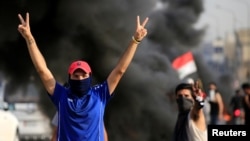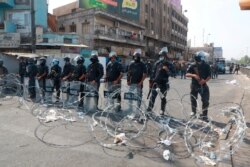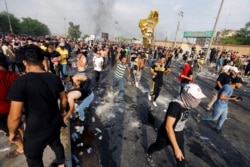Security forces fired in the air and used tear gas Wednesday to disperse groups of demonstrators in Baghdad, killing one and wounding six in renewed protests after violent confrontations between protesters and police a day earlier, officials said.
Heavily armed security forces and dozens of riot policemen blocked all streets leading to a major central square in the Iraqi capital in an attempt to prevent bigger protests, with armored personnel carriers and SUVs standing guard at intersections.
At least two anti-government protesters were killed and more than 200 were wounded after security forces used live ammunition and tear gas on protesters Tuesday who were calling for an end to corruption, improved basic services and more jobs. The confrontations were some of the worst in more than a year and signaled the war-weary country could be facing a new round of political instability.
A few dozen protesters tried to reach Tahrir Square to resume the protests Wednesday but were faced with scores of riot police in full gear who formed a human barrier and soldiers who blocked roads leading to the square from several directions, sometimes with barbed wire. Security forces fired tear gas and live fire in the air to disperse the protesters, chasing them away.
One person was killed and six wounded, according to security and medical officials. A Health Ministry official said the person killed was a 56-year-old man and said forensics were identifying the cause of death. The officials all spoke on condition of anonymity in line with regulations.
Early on Wednesday, Iraqi municipal workers were seen cleaning up Tahrir Square, spraying the street with water while bulldozers removed debris. A bridge that leads from Tahrir Square to the fortified Green Zone — home to government offices and foreign embassies — was closed.
A car was distributing water to protesters and soldiers alike. "We are not against you, you are our brothers," one activist told a soldier as he offered him a cold bottle of water.
In Zaafaraniya, southeast of Baghdad, at least five people were treated for shortness of breath after police used tear gas to break up a small protest. Police also used tear gas in al-Shaab, north of Baghdad. Security officials said five people were arrested in al-Shaab and three in Zaafaraniya.
The protests are the most serious challenge against Prime Minister Adel Abdul-Mahdi's government since it was formed nearly a year ago. They appear to be spontaneous and without political leadership, organized by people on social media against corruption and lack of basic services, such as electricity and water.
They included dozens of university graduates who are unable to find jobs in the corruption-plagued but oil-rich country. Politicians denounced the violence and at least one, influential Shiite cleric Muqtada al-Sadr, called for an investigation.
The protests began peacefully Tuesday but soon turned violent after security forces fought back demonstrators with water cannon, tear gas and live ammunition. Protesters responded by calling for toppling the government, throwing stones at security forces and setting tires and trash containers on fire.
Similar protests and confrontations took place in other provinces, including in the cities of Basra and Nasiriyah in the south. In Nasiriyah, about 200 miles (320 kilometers) southeast of the capital, one protester was killed and around 20 people wounded, according to hospital officials.
Regret over violence
A joint statement issued by the Iraqi interior and health ministries said one person was killed and 200 injured in Baghdad's running clashes Tuesday, including 40 members of the security forces.
It said it "regretted" the violence that accompanied the protests, blaming "a group of rioters" for inciting violence, while calling for calm and restraint.
The special representative of the United Nations, Secretary-General for Iraq Jeanine Hennis-Plasschaert, expressed "grave concern" over the violence that accompanied some of the demonstrations in Baghdad and other governorates.
"Every individual has the right to speak freely, in keeping with the law," she said in a statement, urging authorities to exercise restraint in their handling of the protests.
The Iraqi High Commission for Human Rights called for restraint and said freedom of expression should be protected. It said 11 people were arrested in Basra and 30 in Waset Province south of Baghdad on Tuesday.






